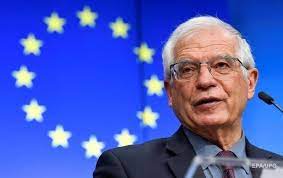
The European Commission has classified Russia and Belarus as countries with the highest risk level in accordance with the EU Regulation on the prevention of deforestation and forest degradation (EUDR), which is an additional safeguard against their forest products entering the European market, said Viktor Smal, head of the State Forestry Agency of Ukraine.
“The European Commission has published an updated list of countries classified according to risk level in accordance with the EUDR. Ukraine, like leading European timber producers, has been given low-risk status. This creates conditions for investors to come to Ukraine and attract investment, opening up new opportunities for Ukrainian exporters of furniture and other forest products, facilitating their entry into the European market. At the same time, Russia and Belarus are among the high-risk countries, which makes it even more difficult for their products to enter the EU. We are working to ensure that countries involved in gray import schemes for Russian timber are also included in the list of high-risk suppliers,” Smal emphasized.
He noted that despite the war, thanks to digitalization and reforms in the forestry sector, Ukraine has managed to obtain the status of a low-risk exporter on a par with Germany, Latvia, Finland, and Poland.
“This is the result of our systemic reforms and digital transformation in the forestry sector, in particular the introduction of such tools as e-logging tickets, e-certificates of origin, and e-TTN with photo documentation,” said the head of the State Forestry Agency.
As reported, in 2022, the EU imposed sanctions on imports of Russian timber, pulp, paper, other wood products, and furniture. This applies not only to imports from Russia but also to the trading of Russian timber through third countries.
According to an investigation by Earthsight, European furniture manufacturers have purchased more than 500,000 cubic meters of Russian-made birch plywood during the war, circumventing sanctions.
World Forest ID experts found that 46% of birch products supplied to the UK and labeled as originating from Ukraine, Poland, Estonia, and Latvia were actually produced in Belarus and Russia.
The EUDR, which will come into force for medium and large companies on January 1, 2026, stipulates that products imported into the EU must not contribute to deforestation or forest degradation. Countries are classified according to risk level — low, standard, and high. Low risk status simplifies exports, reduces the regulatory burden, and enhances the competitiveness of Ukrainian producers in the EU market.
https://interfax.com.ua/news/general/1074828.html

The European Commission may reconsider the regime of autonomous trade measures for Ukraine, which was introduced after the start of Russia’s full-scale aggression, extended twice for a year and now expires on June 5 this year, European Commission Vice-President Maroš Šefčovič said.
“Autonomous Trade Measures (ATMs), which provide for traditional liberalization, will remain in force until June 5. I would like to assure you that after the end of the ATC, we are fully committed to ensuring a smooth transition and rapid implementation of mutual liberalization of trade in agri-food products,” he said at a joint meeting of the Ukrainian government and the European Commission on Monday.
“As you know, this will be a very delicate task for us, given the sensitivity of some products for the markets of our member states and, of course, the concerns of our farmers,” added Šefčovič, who in the new EC composition oversees the direction of trade.
As reported, the EU Council on April 8 approved a decision to extend the suspension of import duties and quotas on Ukrainian exports to the EU until June 5, 2025. At the same time, the EU strengthened the protection of sensitive agricultural products of member states, obliging the European Commission to impose tariff quotas on poultry meat, eggs, sugar, oats, corn, cereals and honey from Ukraine, in case of exceeding the arithmetic average of the volumes imported in the second half of 2021, 2022 and 2023.

The European Commission (EC) has downgraded its forecast for the European Union’s economic growth in 2024 to 0.9% from the previously expected 1%. The forecast for the eurozone’s GDP growth this year remains at 0.8%. In 2025, the European Commission expects the eurozone’s GDP to grow by 1.3% and the EU’s by 1.5%. The May forecast envisaged a rise of 1.4% and 1.6%, respectively. In 2026, the eurozone’s economic growth rate will accelerate to 1.6%, and the EU’s – to 1.8%, the regulator predicts.
“After a long and widespread stagnation, the EU economy returned to growth in the first quarter of this year. As expected in the spring, moderate but steady growth rates continued in the second and third quarters amid further easing inflationary pressures. The prevailing conditions point to a moderate acceleration in domestic demand, despite heightened uncertainty,” the press release said.
According to the EC’s forecast, inflation (HICP index) in the euro area will slow to 2.4% this year from 5.4% in 2023 and weaken to 2.1% in 2025. In May, inflation rates were forecast at 2.5% and 2.1%, respectively. In 2026, consumer prices are expected to grow by 1.9% in the euro area and by 2% in the EU.
“Household disposable income continued to grow at a good pace in the first half of the year, driven by increased employment and the ongoing recovery in real wages,” the report says.
At the same time, the situation with investments was disappointing, as the indicator decreased by more than 2.5% in the first half of the year. The European Commission called increased uncertainty the main negative factor for both consumer spending and business investment.
Unemployment in the eurozone is expected to reach 6.5% this year and drop to 6.3% next year, remaining at this level until 2026. In the EU, unemployment is expected to decline to 5.9% in 2025 and 2026 from 6.1% in 2024.
In 2024, the budget deficit in the EU countries may shrink to 3.1% of GDP from 3.6% of GDP a year earlier, and in the eurozone countries – to 3%. In 2025, the figures will drop to 3% and 2.9%, respectively, and in 2026 – to 2.9% and 2.8%, the EC predicts.
The ratio of total public debt to GDP in the European Union is expected to increase to 83.4% by 2026 from 82.1% in 2023.
Germany’s economy, according to the EC’s forecast, will shrink by 0.1% this year and grow by 0.7% next year. France’s GDP is expected to grow by 1.1% and 0.8%, respectively, Italy’s by 0.7% and 1%, and Spain’s by 3% and 2.3%.
“The economic outlook for the EU remains extremely uncertain, and the risks are largely shifted downward,” the European Commission said in a statement.
These risks include geopolitical risks, in particular those related to Russia’s military aggression in Ukraine and the conflict in the Middle East, as well as foreign trade risks related to possible “protectionist measures by trading partners.” The EC also points to the risks of weak labor productivity growth and the danger of large-scale natural disasters.

The European Commission has disbursed almost EUR 4.2 billion to Ukraine under the Ukraine Facility, bringing the total amount of EU funding allocated to the Ukrainian government under the Ukraine Facility to EUR 12 billion.
This was reported by the European Commission on Tuesday.
“Following a request for disbursement submitted by Ukraine, the Council endorsed the Commission’s assessment that Ukraine has satisfactorily implemented nine reform indicators related to the first regular quarterly payment. These conditions, covering public financial management, management of state-owned enterprises, business environment, energy and demining, were set out in the Plan for Ukraine,” the press release said.
The EC noted that today’s payment follows the initial disbursements made under the Ukraine Facility, namely €6 billion in bridge financing and €1.9 billion in pre-financing, and is evidence of the rapid implementation of the Ukraine Plan.

The European Commission expects Kyiv to fulfill the conditions agreed upon earlier and the European Council to approve the Ukraine Plan, which will allow it to disburse another EUR1.5 billion in April and EUR1.9 billion in May under the Ukraine Facility, said Valdis Dombrovskis, the European Commission’s executive vice president.
“The next disbursement (for the Ukraine Facility) of EUR1.5 billion is scheduled for this month, if the policy conditions are met,” he said in a press statement following the meeting of the EU Council of Ministers (ECOFIN) held on April 12 in Luxembourg.
According to Dombrovskis, the European Commission is currently assessing Ukraine’s plan to draw up quarterly indicators of reforms and investments that need to be made to unlock future disbursements.
“In the near future we will finalize this work and submit the assessment to the (European) Council. Once the approval is received, it will pave the way for Ukraine to receive the pre-financing of EUR1.9 billion, most likely in May,” the Executive Vice President said.
He emphasized that the EUR50 billion Ukraine Facility until 2027 is a lifeline from the EU at an extremely difficult time to help Ukraine maintain key public services and keep the state functioning while Russia wages a brutal war, and recalled that the first tranche of EUR4.5 billion in transitional financing was disbursed in March.
Speaking about the Ukraine Plan, Dombrovskis noted that it will be the main instrument for the implementation of the Ukraine Facility, and it focuses on structural reforms to remove barriers to growth, investments in key sectors, and measures to facilitate Ukraine’s convergence with EU rules and standards as part of its accession path.
As reported, Ukraine expects to receive a total of EUR 2024 billion under the Ukraine Facility, with a total need for external financing of this year’s budget deficit of EUR 37.3 billion.

European Union High Representative for Foreign Affairs and Security Policy Josep Borrell says that the European Commission has paid the first EUR4.5bn from the Ukrainian fund totaling EUR50bn.
He made the announcement on Wednesday in Brussels at a press conference at the end of the EU-Ukraine Association Council.
“Today we made the first disbursement of EUR4.5bn from the EUR50bn Ukrainian Aid Fund to support Ukraine’s recovery, reconstruction and modernization. Tomorrow the European Council will discuss how to further accelerate Ukraine’s accession (to the EU),” Borrell said.